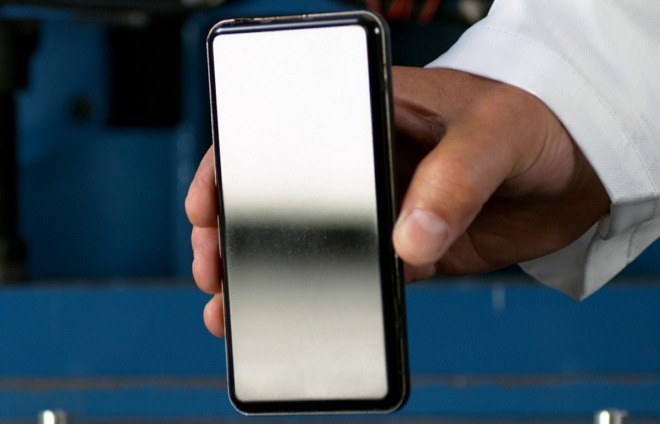Corning unveils Gorilla Glass Victus with enhanced drop, scratch resistance
Long-time Apple supplier Corning has unveiled a new and much more durable version of its popular Gorilla Glass product, dubbed Gorilla Glass Victus.

Credit: Corning
In a YouTube video announcing the product, Corning says that smartphones equipped with Gorilla Glass Victus will be receive considerable improvements to both drop and scratch resistance over the previous Gorilla Glass 6 material.
For example, Gorilla Glass Victus was able to survive 2-meter drops in lab testing. In a Knoop Diamond Scratch Test, it's able to withstand an 8 Newton Load -- significantly higher than the average 2 to 4 rating for competing glasses.
Of course, the glass won't be invulnerable to scratches, particularly when a device is in a pocket with bits of sand or metal. While Corning's Jaymin Amin admitted that harsh environments could still cause a scratch, he said that Gorilla Glass Victus would "reduce those instances quite dramatically."
Interestingly, Amin told The Verge that at least one manufacturer realized that Gorilla Glass Victus' improvements over Gorilla Glass 6 could lead to thinner devices. That unnamed manufacturer said it's opting to put a thinner layer of the new glass, instead of maximizing durability.
Apple uses Gorilla Glass in its devices, and Corning has been the recipient of Apple's Advanced Manufacturing Fund.
Samsung will be the first device maker to introduce a product with Gorilla Glass Victus, with a new device coming "in the next few months." There's no word on when Apple will adopt it for iPhone.

Credit: Corning
In a YouTube video announcing the product, Corning says that smartphones equipped with Gorilla Glass Victus will be receive considerable improvements to both drop and scratch resistance over the previous Gorilla Glass 6 material.
For example, Gorilla Glass Victus was able to survive 2-meter drops in lab testing. In a Knoop Diamond Scratch Test, it's able to withstand an 8 Newton Load -- significantly higher than the average 2 to 4 rating for competing glasses.
Of course, the glass won't be invulnerable to scratches, particularly when a device is in a pocket with bits of sand or metal. While Corning's Jaymin Amin admitted that harsh environments could still cause a scratch, he said that Gorilla Glass Victus would "reduce those instances quite dramatically."
Interestingly, Amin told The Verge that at least one manufacturer realized that Gorilla Glass Victus' improvements over Gorilla Glass 6 could lead to thinner devices. That unnamed manufacturer said it's opting to put a thinner layer of the new glass, instead of maximizing durability.
Apple uses Gorilla Glass in its devices, and Corning has been the recipient of Apple's Advanced Manufacturing Fund.
Samsung will be the first device maker to introduce a product with Gorilla Glass Victus, with a new device coming "in the next few months." There's no word on when Apple will adopt it for iPhone.


Comments
I’ve thought that a screen could be made from layered soft glass and deposited diamond. The glass would move. The way layers of clam shells move, slight slippage prevents breaking. Obviously it would cost more, but I wonder by how much. The layers could be very thin. The diamond top layer only needs to be a few thousands thick. The entire piece could be a tenth as thick as now, while being flexible and obviously, on the surface, hard
I’m happy with any improvement they make - especially since we’re stuck with glass backs now, too. I’ve never broken a screen on any of my iPhones going back to the 3G, but within 2 weeks of getting my Xs I cracked the back, despite having a silicone case on it.
Yeah. Welcome to the tech industry and end-stage American laissez-faire capitalism...
It would be like Intel claiming that a new processor uses 50% less power for a specific task and then suggesting they're lying because a 15" MBP doesn't last twice as long. You know that the processor isn't the only use of energy just as you know that GG isn't the only material that can take or redirect an impact. For all we know, Apple is satisfied with the relative durability of GG so they're taking the bulk of the benefits to allow for thinner substrates and less cushioning in future products. That shouldn't reflect poorly on Corning.
If you ever see Corning’s tests of their glass, you’ll notice that from the very first, the glass has bent remarkably, and had significant resistance to breakage, not only from that severe stress test, but also to the steel ball bounce test, and to the drop tests. But as we all know, real life use isn’t that wonderful.
we also have seen. Over the years, that different phones with the same glass have differing breakage rates. Apple and Samsung have shown significantly different breakage rates each year, despite using the same generation of glass. How do YOU explain that? It’s the design of the phone, the way the edges of the glass is rounded, the way the glass is glued to the frame, etc.
to deny all of this is showing that you don’t want to acknowledge any of it. I’m not saying that the glass isn’t itself getting slightly better each year. I have no doubt it is. But we’ve seen Corning state, before, that that year’s glass was significantly better than previously, only to see breakage rates about the same as before. How do you explain that, if it isn’t a matter of phone design?
i don’t really know just how much better this year’s glass actually is, and nobody here does. But the question is what manufacturers will do with it. If it’s better, will they use thinner glass? At least one manufacturer has already said that it’s what they will do.